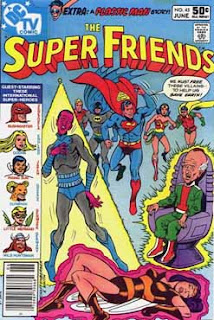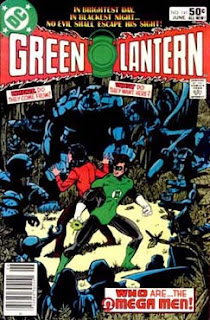Wednesday, March 23, 2022
Wednesday Comics: DC, June 1981 (wk 2 pt 2)
Monday, March 21, 2022
Pulp Inspirations
They paid no attention to Carse, though despite his Martian dress he was obviously an Earthman and though an Earthman's life is usually less than the light of a snuffed candle along the Low Canals, Carse was one of them. The men of Jekkara and Valkis and Barrakesh are the aristocracy of thieves and they admire skill and respect knowledge and know a gentleman when they meet one."
- The Sword of Rhiannon, Leigh Brackett
"At the corner gleamed a luminous red sign, “THE CLUB OF WEARY SPACEMEN.” In and out of the vibration-joint, thus benevolently named, were streaming dozens of the motley throng that jammed the blue-lit street. Reedy-looking red Martians, squat and surly Jovians, hard-bitten Earthmen-sailors from all the eight inhabited worlds, spewed up by the great spaceport nearby. There were many naval officers and men, too—a few in the crimson of Mars, the green of Venus and blue of Mercury, but most of them in the gray uniform of the Earth Navy."
- The Three Planeteers, Edmond Hamilton
"Graff Dingle stolidly watched yellow mold form around the stiletto hole in his arm. He smelled the first faint jasmine odor of the disease and glanced up to where the sun glowed unhappily behind a mass of dirty clouds and wind-driven rain.
Dingle kicked morosely at the Heatwave thug left behind to ambush him, and the charred body turned soughingly in the mud. 'Be seeing you, bully-boy, in about five and a half hours. Your electroblast may have missed me, but it cooked my antiseptic pouch into soup. It made that last knife-thrust really rate.'
There was a dumb dryhorn blunder, Graff reflected, sneering at himself out of a face that was dark from life-long exposure to a huge sun. Bending over an enemy before making certain he was burned to a crisp.
But he'd had to search the man's clothing for a clue to the disappearance of Greta and Dr. Bergenson and—even above Greta—the unspeakably precious cargo of lobodin they'd been flying in from Earth.
So I'll pay for my hurry, he thought. Like one always does in the Venusian jungle."
- "Ricardo's Virus," William Tenn
"The small, round metal platform rocked uneasily under his feet. Beyond the railing, as far as MacVickers could see to the short curve of Io's horizon, there was mud. Thin, slimy blue-green mud.
The shaft went down under the mud. MacVickers looked at it. He licked dry lips, and his grey-green eyes, narrow and hot in his gaunt dark face, flashed a desperate look at the small flyer from which he had just been taken.
It bobbed on the heaving mud, mocking him. The eight-foot Europan guard standing between it and MacVickers made a slow weaving motion with his tentacles."
- "Outpost on Io," Leigh Brackett
Sunday, March 20, 2022
Spock Has A Twelth-Level Intellect
Skrulls and the Founders/Changelings
The Founders are a shapeshifting race that runs an expansionist space empire and so are the Skrulls. DC's Durlans would fit the shapeshifting part, too. They've faced prejudice like the Changelings, but they don't run an empire.
Shi'ar and the Romulans
One species has a space empire with a bird motif and a sprinkling of Roman Empire terminology and the other is the Romulans. Sure, the Romulan Star Empire never seems as multi-species as the Shi'ar, but no reason it couldn't be. Might want to drop the link to Vulcan, though...
Coluans and Vulcans
Turning to DC comics for the Federation species, I'll note the somewhat emotionlessness and computer-like logic of the Vulcans and Brainiac's people, the Coluans.
The other other identifications I thought of, but some are too similar to add anything particularly interesting (The Khunds and the Klingons) and some distant enough to be suggest substitution (Thanagarians and Andorians. Thanagarians might stand-in for Romulans, too, depending on which version we're talking about) but you get the idea.
Friday, March 18, 2022
Whale Hunting in the Skies of Azurth
Our Land of Azurth 5e game continued last Sunday with the party on their way to Virid (still!) and encountering an odd character repairing an airship of the sort they had seen used by the Cloud Folk. He gave his name as Captain Ahab Flint and told them his profession was recovering treasure from balloon whales.
It seems these large but slow-moving creatures sifted clouds for food and invariably swallowed all sort of items from old Cloud Giant civilization. These ancient items could be sold for a profit, if you can induce the balloon whales to vomit them up. Flint was bereft of crew and offered the party a ride to Virid and a share in the treasure for their help. The party agreed.
Flint instructed the party in the use of the net gun to fire the net and reel in the beasts, and the "ticklers" (long poles with leather covered padding on the end) which is used to poke and stroke the balloon whale ribs to make this disgorge the treasure. Finally, he requested one of them server as "the diver" to potentially fish stuck items out of the very mouths of the balloon whales.
Soon, they sight one of the creatures and the hunt was on. The creature looks like a plump, giant manatee with a sad looking almost human face (not unlike a blobfish). They manage to get a haul of weird gold tokens or nonmetallic coins out of the first one.
Flint also has a musical instrument that looks uncannily like an older version of Kully's. Flint says it was given to him by a guy named Drue. Kully does an experiment by scratching a mark inside his instrument, then later he examines Flint's and finds it on the inside!
After a couple of hauls, they hear a thunderous bellowing, which Flint hypothesizes might be the Giant Shepherd of the Night Skies. This being supposedly claims the balloon whales, but Flint has never seen him. Sure enough, an ebon giant whose skin seems marked with stars and nebula comes stalking across the sky. He throws an ice storm at the ship, forcing it to drop precipitously. The party attacks with spells, but the giant seems unfazed. Flint dives and soon they are beneath the clouds and the giant is far behind.
After stopping to effect repairs, the ship arrives in the Virid capital the following day. The party is confused, when all they seem is a vast lack, but Flint tells them its below the magical waters, and they dive down...
TO BE CONTINUED
Wednesday, March 16, 2022
Wednesday Comics: DC, June 1981 (wk 2 pt 1)
The Aquaman backup by DeMatteis/Heck comes to an end (that's even the title). Aquaman and the robot Poseidon with his dad's mind go to confront his crazy mom. She throws a bunch of robots at him in the form of his foes, highlighting how obscure most of Aquaman's rogue's gallery are. In the end, her sister shows up and reveals Aquaman isn't the prophesized one. Atlanna sees the error of her ways and says she's sorry, then destroys herself and the robots. Aquaman opines that as far as he's concerned, this parents were gone a long time ago, practically stating outright that this storyline will be ignored in the future.
Monday, March 14, 2022
Marvel Super-Heroes with Step Dice
I got a set of those unusual DCC polyhedrals this weekend just for the hell of it, and I was musing on Discord how you could replicate the MSHRPG rankings (Feeble to Unearthly) with a complete set of those dice, like this: Fe (d4), Pr (d5), Ty (d6), Gd (d7), Ex (d8), Rm (d10), In (d12), Am (d14), Mn (d16), Un (d20).
I suppose switching to that sort of mechanic would allow you to ditch the action table, but but keeping something even loosely approximate to the success percentages of the actual game would probably be complicated enough to require one, as shown here:
If you didn't care about sticking as closely as possible to Marvel's percentages (and admittedly, even with this, you've had to give up on the chance of a red success for lower scores) then you could give flat roll thresholds: 4 for green, 7 for yellow, and 10 for red.
I don't actually think there is any reason to do this, but it was amusing to think about.
Thursday, March 10, 2022
Pulp Sci-Fi Technology
Star Wars (and to a lesser extent Star Trek) are products of their respective eras in regard to the futuristic technology then portray (or don't feature), but both are also probably beholden to their pulp antecedents and the imagine (and failures of imagination) of the authors that wrote them.
- Radium: Radium seems almost sort of unobtanium in a lot of old stories, an is imbued with uses and properties it doesn't really possess in real life. This goes along with...
- Radiation: Various sorts of radiation (or even sometimes a vaguer property called "vibration" of matter or energy) can do almost magical things. This continues in science fiction, of course, but by the Atomic Age the language used to describe it much less mystical.
- Mechanical not Electronic: One can hardly fault writers of the 20s-40s for not including many (or often any) computers in their works, beyond the occasional mechanical brain, but it's interesting how even the electrical devices appear sparingly, outside of things like visiplates/visiphones (visual communication devices). Some more planetary romance leaning authors like Leigh Brackett, tend to describe virtually none of this sort of technology. This has implications we might not think of: Edmond Hamilton's stories for instance have no jail cells with coded keypads or even simply push button keypads like Star Trek. All his futuristic locks seem to require a hand held "vibratory key."
- Planet and ship based: Artificial satellites and space stations are very rare. In fact, I don't think I've read a story written before the 50s that had them.
- Acquired not Synthesized: Many more breakthrough materials or pharmaceuticals are harvested from alien worlds that made in the laboratory. Even breakthrough laboratory discovers often require some exotic "natural" material.
- Solitary Inventor: Great scientific leaps from space travel to super-weapons are typically the province of single geniuses or experimenters, not teams of government or industry-funded scientists. First space travel is almost always mentioned as a work of a sort of Wright Brothers instead of a NASA.
- Atomic Energy: Everything is atomic powered it seems like.
- No TV: I'm sure there are stories that make reference to something like television as an entertainment medium, but it appears in very few stories.




























